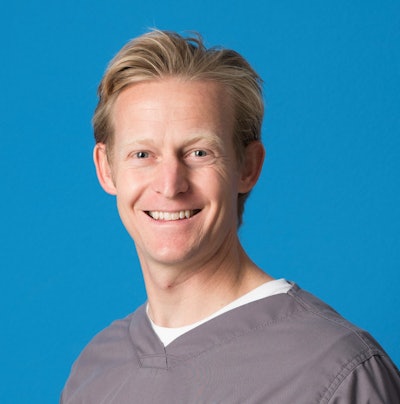With college students forced to return home during the coronavirus pandemic, many lack or have limited access to their on-campus medical or mental health care services.
School doctors and counselors are licensed within their specific state and therefore cannot treat out-of-state students, according to Dr. Alan Dennington, chief medical officer at TimelyMD, a telehealth company.
 Dr. Alan Dennington
Dr. Alan Dennington“Feeling anxious and concerned about COVID-19 is common and normal,” he said. “College students are particularly impacted by campus shutdowns, social isolation, cancellations, financial concerns and the loss of campus resources compounds those concerns.”
In response to the pandemic, TimelyMD launched the Campus.Health program. Colleges and universities are offered an eight to 24 week program in order to cover health care during campus closures. Students can receive virtual access to medical and mental health professionals at no cost.
“The great thing about telehealth is that it lowers barriers to receiving care and can reach any student with access to a smartphone or a computer,” said Dennington. “We know college and university leaders have an endless list of decisions to make right now, with more questions than answers. Our hope is that Campus.Health can make their load a little lighter by providing an immediate solution that students will love.”
The program’s medical providers and counselors are available in all 50 states and are versed in a wide range of medical conditions and mental health needs. Students can choose their medical professional or counselor based on their profile and description. In order to treat patients, students provide their symptoms over the phone or through a video appointment and will receive a care plan and medication prescription if necessary.
For mental health needs specifically, the program implemented Talk Now, which provides students with 24/7 access to professionals as a way to discuss their anxieties, stress and symptoms.
“The coronavirus has fundamentally changed everything about how higher education supports students and how people are accessing healthcare,” said Dennington. “Telehealth is not a luxury anymore, it’s an imperative, especially given the increased risks of seeking in-person care that’s unrelated to COVID-19 or an emergency.”
Dennington said the university’s role is to “recognize that there is a need [for telehealth care] and to identify a solution to care for their students.”
“College and university leaders are going to extraordinary lengths to support students at a time when nothing is certain,” he added. “Simply providing them with an outlet or someone to talk to is just one of many steps administrators can take to continue to show students they care.”
The Claremont Colleges Services, a consortium of seven schools in California, recently implemented Campus.Health on their campuses.
 Janet Smith Dickerson
Janet Smith Dickerson“The response by students to Campus.Health has been quite promising so far,” said Janet Smith Dickerson, vice president of student affairs of The Claremont College Services. “Utilization rates have grown and the feedback from students, while limited, has been mostly positive.”
As of April 15, 85 students have accessed the program. Of that number, two-thirds of the calls have been for counseling/behavioral health reasoning to discuss issues such as anxiety and loneliness. The other third of the calls has been for medical consultations, she said.
“We are seeing that our graduate students are very active users,” Dickerson added. “Waiting times have been brief. A student expressed appreciation to have access to a counselor whose ethnicity was the same as hers.”
In addition to Campus.Health, TimelyMD also created a program in 2018 for universities and colleges to use as an extension of their current on-campus health offices or to provide services for those without any in place.
Prior to the pandemic, Paul Quinn College had already been using the comprehensive program.
Dr. Stacia’ Alexander, mental health clinic coordinator at Paul Quinn College, said the school had been doing a lot of work to remove the stigma surrounding seeking mental health care. For instance, town hall meetings were hosted on campus where students could come together to discuss the “parameters of mental health care.”
Now moving online, the school sends out informative newsletters twice a month and regularly checks in with students via email. This month, there will also be a live stream for the student body to get its questions answered.
“We laid the groundwork pretty heavily before the pandemic hit,” she said. “Every time we send out a newsletter, we do remind them that they still have access to TimelyMD or Talk Now. They can use it for family counseling, medical care. We are steadily pushing that dialogue into all of the information that’s been going out.”
According to Alexander, more than 70% of Paul Quinn College’s students have some history of trauma.
“We have to be aware that they are likely going back to situations that made them the most uncomfortable before coming to college,” she said. The institution made allowances for students to adjust and even made alternate arrangements for those students who had to leave the Dallas area due to the campus shutdown. “Now, almost a month in, we are hoping they are settled into their respective places and are getting back into a routine of things and we will see an increase in usage [within the comprehensive program].”
Alexander said the goal is for students to use the platform as part of their normal routine, readily checking in with their therapists.
Sarah Wood can be reached at [email protected].



















